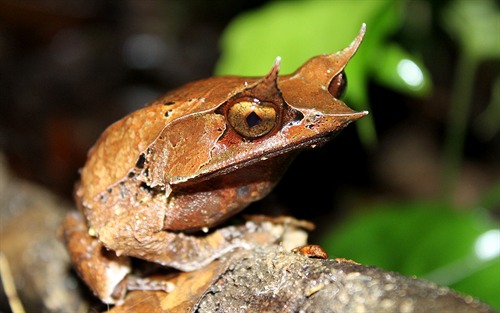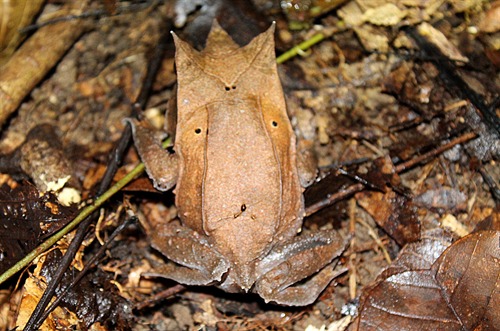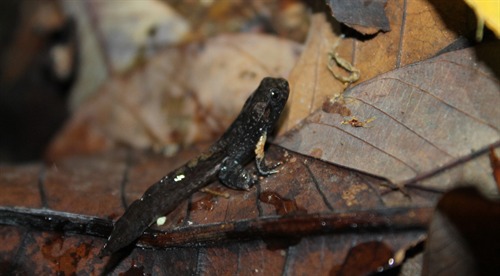
Back
Megophrys nasuta (Schlegel, 1858)
| Family Name: | Megophryidae |
| Taxonomic Group: | Vertebrates (Amphibian) |
| Common Name: | Malayan Horned Frog |
The Malayan Horned Frog has a snout that is distinctly pointed and horn-like skin flaps present above the eyes, giving it excellent camouflage on the forest floors of the Central Nature Reserves, where they are confined to in Singapore. It has a loud call that sounds like a metallic honk.
Name
Description
| Size | SVL 16cm |
|---|---|
| Description | Body robust, hind limbs relatively short and slender. Head broad and flat, snout distinctly pointed, horn-like skin flaps present above the eyes. Skin mostly smooth, four longitudinal ridges along the back. Dorsal surface grey to brown. Its call is loud and sounds like a metallic honk, often heard just before rain at dusk. Tadpoles are elongated, mottled dark brown, with mouths upward-facing, and broad, fleshy lips. |
Ecology, Habitat & Location
| Ecological Notes | Inhabits mature forest and swamp forest where it is usually found on the forest floor, and along small shallow streams. Its body shape and colour patterns closely resemble dried leaves, and individuals can be hard to find. Its excellent camouflage also enables this voracious predator to ambush unsuspecting small animals. |
|---|---|
| Habitats | Forest, Terrestrial |
| Distribution | Occurs in the Malay Peninsula, Borneo, and Sumatra. In Singapore, confined to the Central Nature Reserves. |
| Nature Reserves | Central Catchment Nature Reserve, Bukit Timah Nature Reserve |
Conservation
| Trends & Threats | Habitat degradation, particularly from the possible drying up of the Bukit Timah forest. May be collected to supply the pet trade. |
|---|---|
| Scientific Interest & Potential Value | This unusual looking frog has some commercial value as an exotic pet. |
| Conservation Notes | Continued protection of known habitats. Strict policing against illegal collecting. Artificial propagation of this species can help ease the collecting pressures on wild populations. |
Status
| Species Status | Native |
|---|---|
| Conservation Status | Uncommon |
| Singapore Red Data Book Status | Endangered (EN) [2008], Vulnerable (V) [1994] |
Photos
References
| References | Baker, N. & Lim, K. 2008. Wild animals of Singapore. Singapore: Draco Publishing and Distribution Pte Ltd. 180pp Davison, G.W.H., Ng, P.K.L. & Ho, H.C (Eds.). 2008. The Singapore Red Data Book (2nd Edition). Singapore: Nature Society (Singapore). 285pp Ng, P.K.L. & Wee, Y.C. (Eds.). 1994. The Singapore Red Data Book (1st Edition). Singapore: Nature Society (Singapore). 343pp |
|---|





